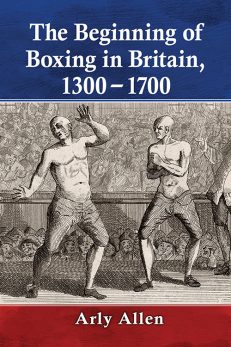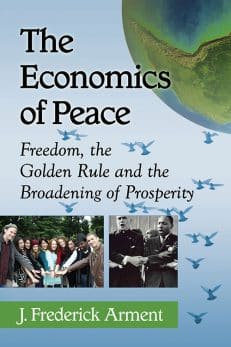-
×
 The Beginning of Boxing in Britain, 1300–1700
1 × $39.95
The Beginning of Boxing in Britain, 1300–1700
1 × $39.95 -
×
 Seabee 71 in Chu Lai
1 × $35.00
Seabee 71 in Chu Lai
1 × $35.00
Subtotal: $74.95
Freedom, the Golden Rule and the Broadening of Prosperity
Original price was: $29.95.$23.99Current price is: $23.99.
In stock
From the Arab Spring to the Occupy and Tea Party movements, the “What now?” solution to economic disparity and power politics has been largely unarticulated. This work details how the Golden Rule ethic and a technology-driven global consciousness are causing epic shifts in our economic and governing systems. The evolution from nation-state capitalism to a collaborative economy with judicial governance is proving that prosperity is compatible with peace. With ten case studies of successful “Golden Rule” organizations and an innovative study of the reciprocal ethic, this book provides accessible, thought-provoking analysis of rapid worldwide change and forecasts a future of freedom, purpose and hope.
Instructors considering this book for use in a course may request an examination copy here.
J. Frederick Arment
Format: softcover (6 x 9)
Pages: 264
Bibliographic Info: 12 photos, notes, bibliography, index
Copyright Date: 2015
pISBN: 978-0-7864-9638-9
eISBN: 978-1-4766-1890-6
Imprint: McFarland
Introduction: Global Consciousness as Manifestation of the Golden Rule 1
Section One: The Relational Ethic of Freedom 13
1. The Motive of Freedom in a Culture of Peace 14
2. The Imperative for an Alternative Gold Standard 23
3. The Archetype of the Golden Rule 30
4. Vision of a Peace Economy 38
5. From the Golden Mean to the Golden Rule 49
Section Two: A Moral Economy 61
6. The Relational Economic System 62
7. Case Study—The Service Sector: Rotary International and the Freedom to Contribute 73
8. Equality in Association 79
9. Case Study—The Faith-Based Sector: St. Luke Foundation and the Freedom to Love 89
10. Purposeful Innovation 96
11. Case Study—The Arts Sector: Apple Computer and the Freedom to Create 104
12. Collaborative Distribution 111
13. Case Study—The Environmental Sector: Hindustan Unilever and the Freedom to Sustain 119
14. Fair Reward 124
15. Case Study—The Commerce Sector: Salesforce.com and the Freedom to Trade 131
Section Three: Judicial Governance 137
16. What Is a Judicial Governance System? 138
17. Case Study—The Recreational Sector: The Olympic Spirit and the Freedom to Celebrate 153
18. Case Law and Precedent 158
19. Case Study—The Civic Sector: The High Line and the Freedom to Share 167
20. Equal Access to the Law 174
21. Case Study—The Wellness Sector: Intuitive Surgical Inc. and the Freedom to Heal 185
22. Democratic Judiciary 191
23. Case Study—The Academic Sector: The Khan Academy and the Freedom to Learn 201
24. Fair Enforcement 208
25. Case Study—The Security Sector: iRobot and the Freedom from Fear 219
Section Four: The Case for Transition 225
26. How Do We Transition to a Just Economy? 226
27. Our Future Is Golden 236
Chapter Notes 241
Select Bibliography 248
Index 254
“Highly recommended”—Midwest Book Review
